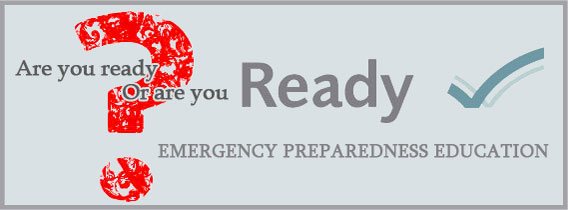Creating Confidence to Care
our courses give people the confidence to take charge and make a life giving diffrence
Emergency Preparedness and You
Get Prepared: You May Need to be Self Sufficient for Three to Five Days
After the recent hurricanes in the Americas and in the wake of the tsunami in Asia, emergency preparedness is gnawing at the edge of our collective consciousness; it reinforces the need for all of us to be prepared to be self-sufficient in a time of crisis --especially in the magnitude of disasters like the world has seen in the past year. We also face the omnipresent threat of terrorist attacks; each of us may be called upon to help a fellow traveler, possibly in the mist of our daily commute to work or while shopping at our local market. Now is the time to take stock of your personal situation. Are you prepared?

Preparedness goes far beyond having a flashlight, water and a battery-powered radio. Having training in CPR and first aid is critical, as you are likely to be the emergency responder for your family or in your workplace or neighborhood when Emergency Medical Services are delayed or unavailable.
Recent world events, like US hurricanes and their aftermath, the London underground bombings and the deadly waves of Asia clearly demonstrate how disasters of such magnitude can quickly overwhelm the Emergency Services network, leaving you as the first link in the chain of survival. You should be prepared to be self-sufficient for at least three to five days. This includes food and water as well as having the skills necessary to manage medical emergencies.
You can get CPR, AED and first aid training in your neighborhood from Emergency First Response. Our training approach to training builds your confidence to provide care when there is a medical emergency - and confidence is everything when a true emergency is at hand. We do this by teaching CPR and first aid skills in a non-stressful learning environment and providing more hands-on skill practice time. General academic information is covered using our independent study materials. This allows the instructor to focus class time on skill development rather than lecture. More practice time means better skill retention, which gives you the confidence to respond in the event of a medical emergency.
Courses are offered worldwide through our network of more than 31,000 Instructors and Instructor Trainers. Now is the time to get trained. As the terrible reality of disasters makes us all aware, we are vulnerable, but we are not helpless.
